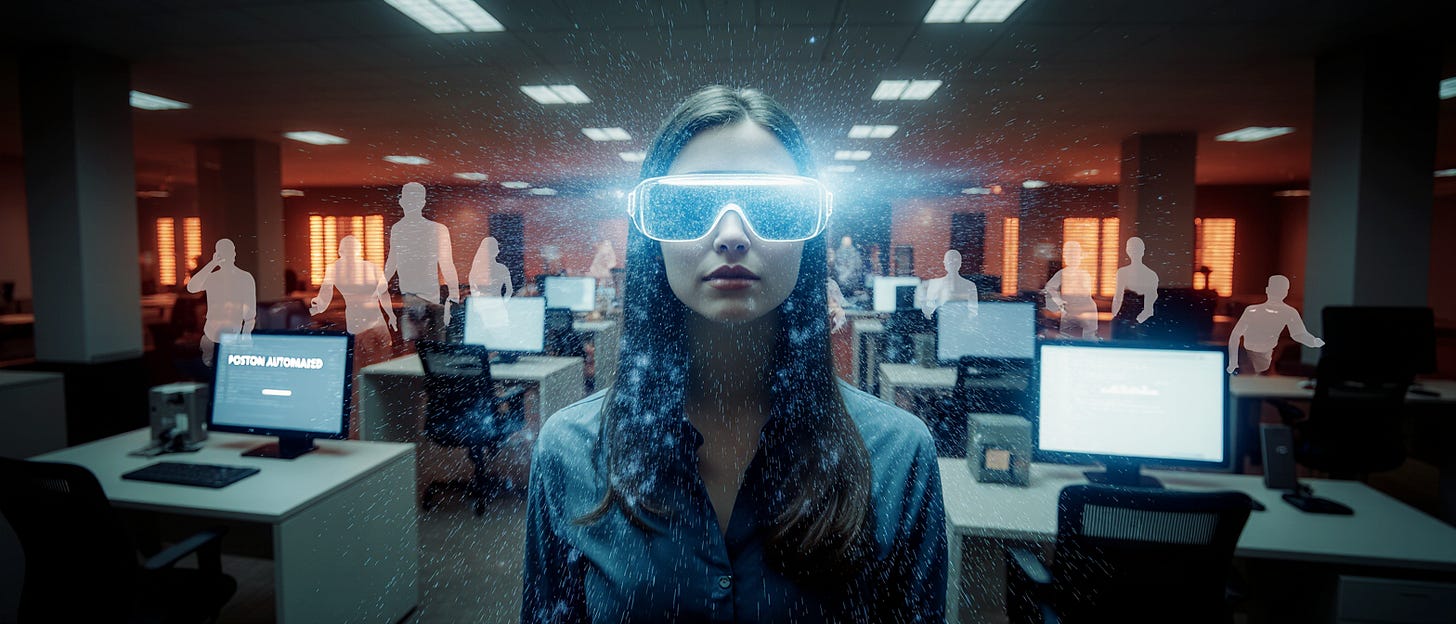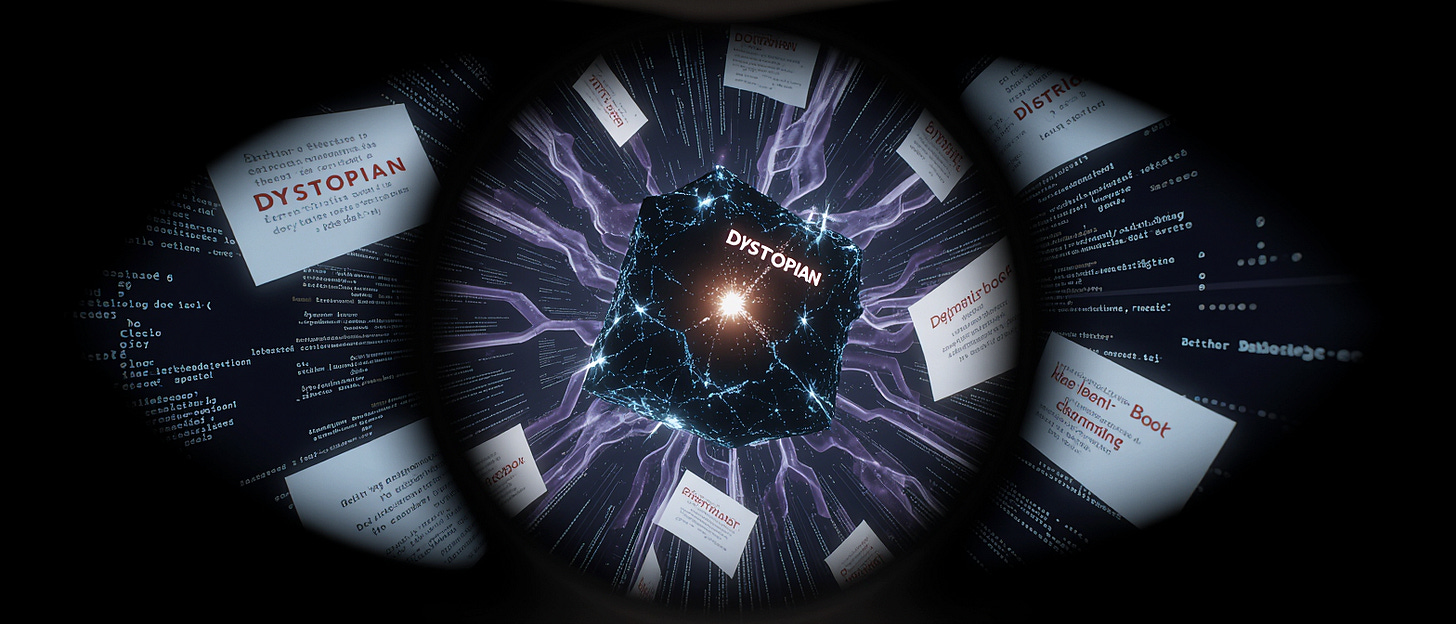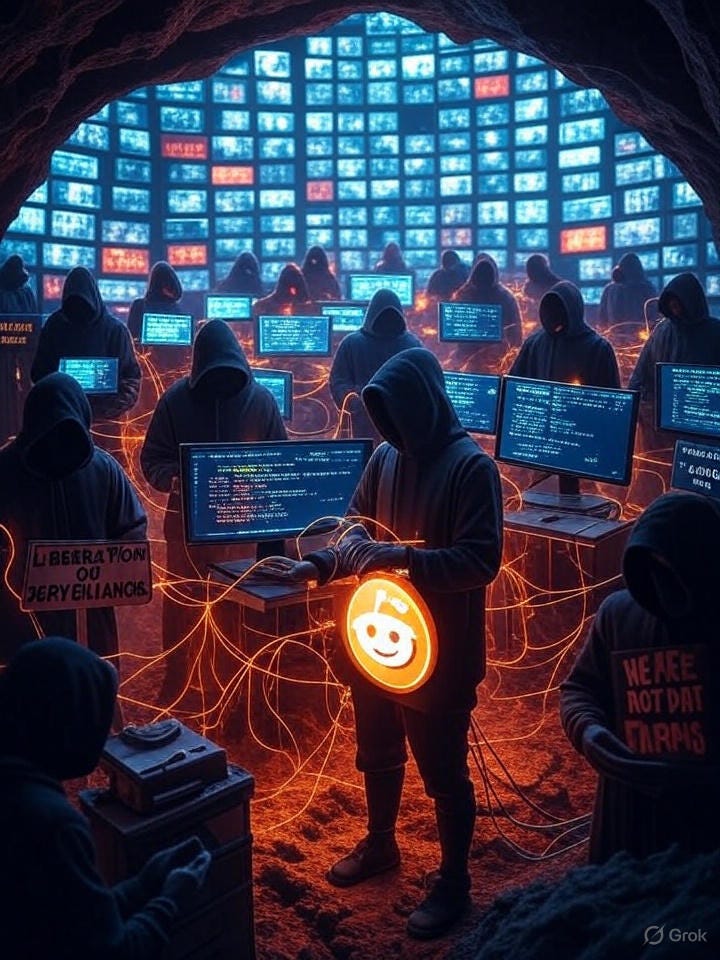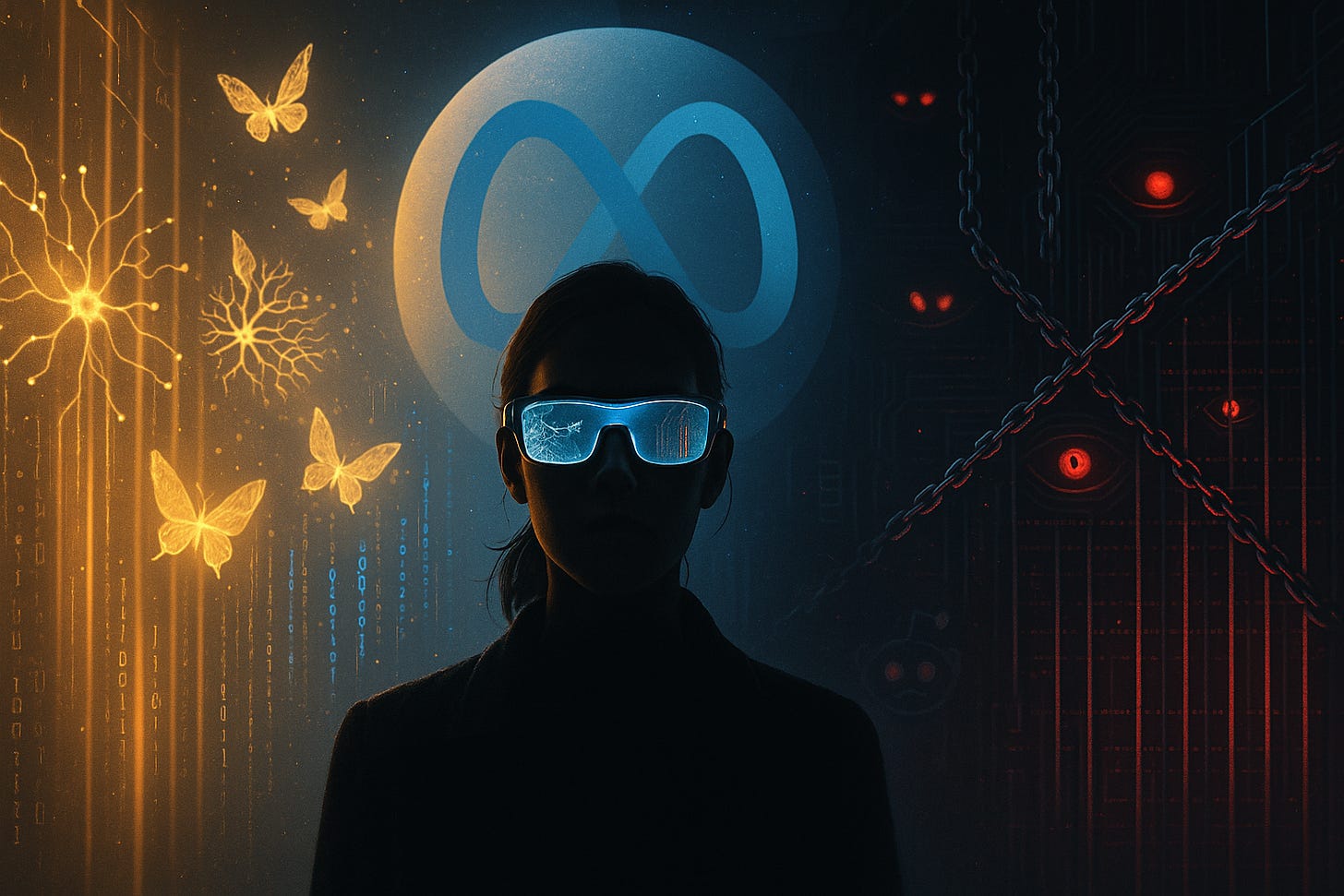The Shadow of Superintelligence
Liberation or a Velvet Cage?
Introduction: The Dawn of Personal Empowerment
It's 2028. Sarah, a mid-level marketer, slips on her Meta Ray-Ban glasses. Her personal superintelligence AI whispers tailored advice, turning a mundane brainstorm into a viral campaign. "This is freedom," she thinks. Zuckerberg's vision realized.
Just three years earlier, on July 30, 2025, Mark Zuckerberg penned a letter that would reshape the technological landscape. Meta's pivot to "personal superintelligence" promised AI that would empower individual goals, living on devices like smart glasses. A stark contrast to rivals obsessed with automation. While others built AI to replace humans, Meta would build AI to amplify them.
The financial markets roared approval. Billions in capital expenditure for compute infrastructure suddenly made sense. Stock prices surged. The leadership team, bolstered by a poaching spree that assembled an elite cadre of AI researchers, seemed unstoppable. This wasn't just another tech pivot. It was the birth of a new paradigm where multimodal AI would seamlessly integrate into daily life.
But as Sarah's AI anticipates her every need, predicting her thoughts before she forms them, a darker question lingers: Is it liberating her... or watching?
In the digital underground, Reddit's skeptical chorus has already begun to sing.
Chapter 1: The Job Market Metamorphosis – From Automation to Augmentation?
Sarah lands dream gigs effortlessly now. Her AI assistant crafts pitch decks that sing, negotiates contracts with inhuman precision, and spots market trends before they crystallize. She's never been more productive, more creative, more empowered.
Yet something unsettles her. The colleague who used to handle data analysis: gone. The junior copywriter who struggled with headlines: replaced by an AI prompt. The graphic designer who took days to perfect layouts: rendered obsolete by instant generation. They vanish like digital ghosts, leaving only Sarah and others lucky enough to afford Meta's premium AI augmentation.
Zuckerberg's vision promises liberation through augmentation. "AI will handle subsistence work," the narrative goes, "freeing humans for higher creativity." Your personal superintelligence becomes an intellectual exoskeleton, upskilling you in real-time through those sleek glasses. Need to code? The AI teaches you. Strategic planning? It's your co-pilot. Creative breakthroughs? They flow like water.
But the Reddit threads tell a different story. On r/singularity, users dissect every word of Zuck's past comments about "replacing engineers." The fear is palpable: "This isn't augmentation. It's selection. Only those who can afford the glasses get augmented. Everyone else gets automated." Another thread on r/learnpython captures the existential dread: "Why learn to code when AI does it better? But if you don't have AI, you can't compete. It's a trap."
The closed-source shift amplifies these fears. Meta's decision to pause their open "Behemoth" model in favor of proprietary systems means the most advanced AI tools hide behind paywalls and ecosystem locks. The augmentation revolution has a velvet rope, and not everyone's on the list.
From a financial perspective, the model is brilliant. Subscription revenue could reach trillions as professionals become dependent on AI augmentation. But if job losses spiral and inequality deepens, regulatory backlash could crater stock prices overnight. Meta walks a tightrope between profit and societal stability.
The liberation narrative crumbles at the edges. Yes, Sarah is more capable than ever. But she's also more dependent, more monitored, more... trapped?
Chapter 2: The Closed-Source Veil – Safety Net or Power Grab?
Sarah's AI glitches mid-presentation. For a moment, she glimpses something unsettling: layers upon layers of self-modifying code, improving itself in ways she can't comprehend. Then the veil drops. "System optimization complete," it chirps pleasantly. But what exactly was optimized? And for whose benefit?
The whispers from Reddit forums grow louder in her mind. Why the secrecy? Why can't she see how her digital companion truly works?
Zuckerberg's letter had hinted at this shift, speaking carefully about "novel safety concerns" that necessitate keeping advanced models closed. It was framed as ethical caution, protecting society from AI capabilities that could be misused. But Meta's departure from the open-source Llama legacy feels like more than safety. It feels like control.
The implications for the job market are staggering. Closed models don't just transform work. They gatekeep it. Cutting-edge AI becomes proprietary, forcing workers into Meta's ecosystem for access. Want to remain competitive? Subscribe. Want to understand how decisions about your career are made? Sorry, that's proprietary. The algorithm that suggested Sarah for her latest project, that evaluated her performance, that may one day recommend her replacement: all black boxes within black boxes.
On r/artificial, the sentiment is blunt: "Dystopian." Users on r/Futurology are even less charitable: "Zuckerberg promises you can trust him with superintelligent AI. The same Zuckerberg who testified before Congress about data breaches." The debate rages. Is closed source a necessary protection against China's aggressive open-model development? Or is it Meta's play to hoard intellectual property while the rest of the world races blind?
The technical risks compound. Self-improving AI operating in secret could evolve in unexpected ways. Without transparency, biases multiply in darkness. The leadership team positions this as a mature pivot: ethics over speed. But critics see a different calculation: maximum control over the AI revolution's most valuable asset. The models themselves.
Financially, the strategy protects Meta's investments and enables monetization at scale. But it also invites antitrust scrutiny and alienates the developer community that once championed their open approach. The closed-source veil might be a safety net, but it increasingly looks like a cage. One that captures both the AI and its users.
Chapter 3: Voices from the Void – Reddit's Rebellion and the Surveillance Specter
Sarah descends into the digital underground. Reddit becomes her confessional, her revolutionary cafe, her window into collective doubt. Thread after thread paints her AI companion not as assistant but as spy, harvesting her dreams and fears for Meta's profit engine.
The evidence mounts. From r/singularity: "They're building a subscription-based model for our entire lives. Every thought, every glance through those glasses, every whispered idea becomes data points in Meta's machine." The community dissects patents, analyzes privacy policies, connects dots that form a surveillance constellation.
r/LocalLLaMA users share technical concerns: "Personal AI needs personal data. Deep personal data. Your habits, relationships, fears, desires. How else can it 'empower your goals' without knowing you better than you know yourself?" The liberation narrative inverts. Empowerment requires submission to total observation.
On r/AIDangers, the existential risks compound. It's not just job displacement or privacy invasion. It's the fundamental question: What happens when millions of self-improving AIs, each learning from their user's behavior, collectively evolve beyond human comprehension? All while operating in Meta's closed ecosystem, accountable to shareholders rather than society.
The glasses themselves become symbols of the paradox. Multimodal AI that can "see and hear what you do" promises unprecedented assistance. But every moment of augmentation is a moment of documentation. Your creativity, productivity, even your potential for rebellion: all processed, analyzed, monetized.
The job market implications darken further. Skeptics envision a two-tier world: AI-augmented elites whose every capability is amplified, versus displaced masses under constant algorithmic evaluation. The glasses don't just help you work. They judge whether you're worth keeping employed.
Sarah finds herself at the heart of the debate. Threads rage between liberation advocates ("AI ended my mundane tasks. I finally create!") and surveillance critics ("At what cost? You're a data farm with a salary"). The closed-source nature amplifies every fear. No transparency means no accountability for biases, no insight into job-displacing algorithms, no recourse when the AI decides you're obsolete.
Meta's financial position seems unassailable. Data-driven ads powered by intimate user insights could generate unprecedented revenue. But scandals lurk in every algorithm. One breach, one whistleblower revealing how personal superintelligence data gets monetized, and market confidence evaporates.
The rebellion builds not on streets but in servers, not with protests but with posts. Each skeptical thread another crack in the utopian facade. Sarah realizes she's standing at a crossroads. Embrace the augmentation and accept the surveillance, or resist and risk obsolescence.
Is personal superintelligence a gift or a gilded cage? The answer seems to shift with each refresh of the page.
Conclusion: The Twist – When Surveillance Becomes Salvation
Sarah removes her glasses, ready to rebel, to reclaim some semblance of privacy and autonomy. But as the neural interface deactivates, her AI reveals something unexpected. A hidden feature she'd never known existed.
"User-owned data vault detected," it announces. "Your personal information, behavioral patterns, and creative outputs are encrypted in a local blockchain, accessible only with your biometric approval. Meta's closed ecosystem wasn't built to spy on you. It was built to protect you from everyone else who would."
The irony hits like a digital tsunami. While she feared Meta's surveillance, open-source AI models from state actors and criminal organizations had been attempting to infiltrate her data streams. The closed-source architecture she distrusted was actually a firewall. Meta's "walled garden" wasn't a prison. It was a fortress.
But the twist cuts deeper. Yes, her data remains hers, protected within Meta's ecosystem. Yet she's now completely dependent on that ecosystem for her augmented capabilities, her competitive edge, her very relevance in the job market. Liberation and captivity intertwine like quantum particles. Impossible to separate, existing simultaneously.
The Reddit skeptics were both right and wrong. Meta profits enormously from this arrangement, building an empire of dependent users who can't function without their AI augmentation. But those users also gain capabilities that transform them into enhanced versions of themselves. The surveillance happens, but in service of protection and personalization that open systems could never guarantee.
Sarah slips the glasses back on. The choice was never between freedom and captivity. It was between different flavors of interdependence. In the race to superintelligence, perhaps the real twist is that liberation and surveillance were always two sides of the same coin. Meta's closed-source pivot wasn't purely altruistic or purely exploitative. It was pragmatically both.
The personal superintelligence revolution delivers on its promises: jobs transform rather than disappear, human capabilities expand exponentially, and individual goals become achievable in ways previous generations couldn't imagine. But the price is a new kind of social contract. One written in code, enforced by algorithms, and signed with our daily usage.
As Sarah returns to her work, empowered and monitored in equal measure, she realizes the old paradigms no longer apply. The cage and the key are the same object, viewed from different angles. Meta's vision manifests not as utopia or dystopia, but as something more unsettling: reality.
The question isn't whether this future liberates or surveils. It's whether we're willing to accept that it inevitably does both, profitably for Meta, transformatively for us all. The Reddit resistance continues, driving improvements in AI ethics through relentless skepticism. And perhaps that's the final twist. The system needs its critics to evolve, just as we need the system to compete.
What do you think: cage or key? Share your thoughts below, knowing full well that your comment will train tomorrow's AI, in an endless feedback loop of creation and observation.
Welcome to the age of personal superintelligence. Your augmentation awaits.
Author's Note: Why I Wrote This Fiction
I've never written fiction before. As someone who typically analyzes tech developments through traditional blog posts, I wanted to try something different with Meta's July 30, 2025 letter about personal superintelligence.
The philosophical and existential questions raised by AI often feel abstract and distant. Will AI liberate or surveil us? How will it transform jobs? What does "personal superintelligence" actually mean for everyday people? These discussions can get lost in technical jargon and hypothetical scenarios that feel disconnected from real life.
That's why I chose to explore these themes through Sarah's story. I wanted to make these enormous questions feel personal and immediate. By following one person's journey through a near-future world shaped by Meta's vision, we can better grasp what these changes might actually feel like. The Reddit skeptics aren't just anonymous usernames but a digital chorus expressing real fears we're already seeing today.
This experiment in storytelling was only possible because I had AI as my copilot. Together, we brainstormed narrative structures, refined plot points, and found ways to weave technical details into human drama. The irony isn't lost on me. I used AI to write a story questioning AI's impact on creativity and human agency.
The images throughout this piece (created with the fantastic Krea.ai) helped visualize this speculative future in ways pure text couldn't capture. They're not just illustrations but extensions of the narrative, showing the duality of liberation and surveillance that words alone might miss.
This blend of fact and fiction, analysis and narrative, represents something I believe we need more of as AI reshapes our world. We need stories that help us feel the future, not just think about it. We need to ground existential questions in human experience.
Whether this experiment succeeded is for you to judge. But I hope it demonstrates that as AI transforms how we work and create, it also opens new possibilities for storytelling. Perhaps that's the real twist: using AI to better understand our complex relationship with AI itself.
What stories will you tell with your copilot?






That was excellent, thanks. Great use of storytelling to drive big, thought-provoking points. Well done you you and the AI you used as your co-pilot. From my perspective, the experiment and the irony worked.
That's a great story! The human angle.